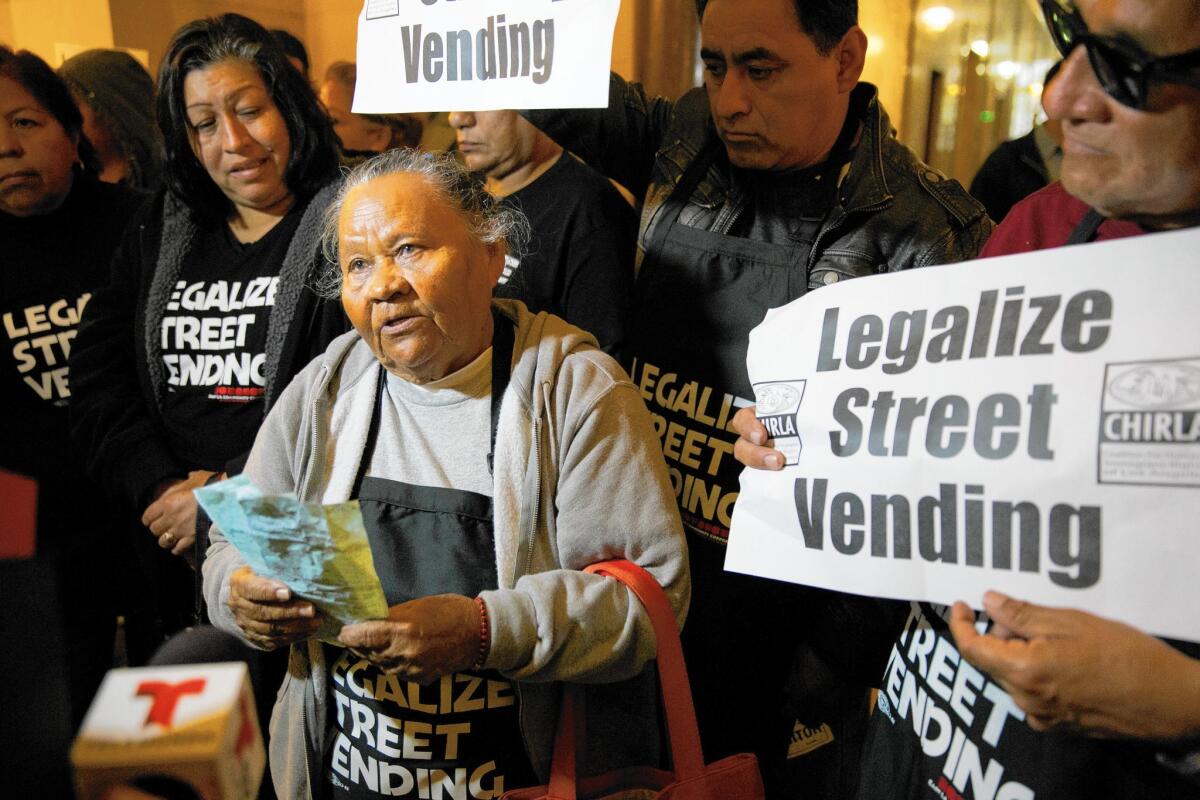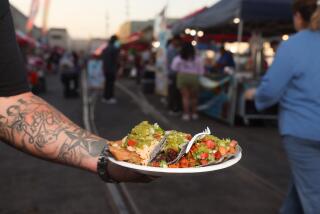L.A. officials take a step toward legalizing street vending

- Share via
A committee of Los Angeles lawmakers took a step Tuesday toward legalizing street vending, vetting a basic framework for how sellers who ply their trade on sidewalks or in parks could get city permits.
But the plan is far from a done deal, as fierce debate swirls around whether to legitimize an underground economy that has long been an open secret on Los Angeles sidewalks. Backers see legalization as an economic boon to the city and a lifeline to honest entrepreneurs, while critics worry about trash, congestion and a squeeze on bricks-and-mortar businesses.
The city is peppered with pushcarts shilling popsicles or bacon-wrapped hot dogs, booths arrayed with clothing, pins and knickknacks, and many other sidewalk enterprises — a trade that generates more than $500 million in annual sales, according to estimates from the nonprofit Economic Roundtable. Legalization could affect an estimated 50,000 vendors in the city.
“The current system is broken,” said Councilman Jose Huizar, one of the lawmakers who have pushed to legalize and regulate street vending. “It doesn’t work for anyone. Vendors who want to become legitimate and play by the rules have no options.... The public has absolutely no guarantee about food safety because it is not regulated. And the city receives no tax dollars” from a booming underground industry.
A coalition that backs legalization, the Los Angeles Street Vendor Campaign, says L.A. stands alone among the 10 biggest U.S. cities in totally outlawing the practice. The Bureau of Street Services hands out hundreds of citations to street vendors annually, each of which can result in fines of as much as $1,000 and jail time. Police arrested more than 1,200 street vendors last year, according to a city report.
Alfonso Garcia, who sells pozole, menudo and tortas at Hansen Dam park, said his tables and other equipment had been confiscated by the city twice in the last six months, forcing him to spend hundreds of dollars to replace them and keep his business going. Being able to do business legally would give him peace of mind, Garcia said.
“We want them to not treat us like delinquents,” said Jose Moreno, who sells raspados, or shaved ice treats, in the San Fernando Valley. “We want them to bring us into the light of day.”
Under the plan discussed Tuesday, street vendors would be required to take a course on city rules, provide proof of liability insurance, and register to pay business taxes, among other requirements laid out Tuesday before a City Council committee. If they plan to sell food, they would also have to get the blessing of the Los Angeles County Public Health Department.
Once street vendors cleared those hurdles, they would be able to apply for a permit from either Street Services or the parks department, depending on where the vendor wanted to hawk goods.
City officials still have to figure out many more details before lawmakers can legalize street vending, including what kind of goods could be sold, what fees would be imposed for a permit, and what days and hours street vendors could operate.
In the face of bitter disagreement over the proposal, Councilman Paul Koretz cautioned that the city still had to make “fundamental decisions.”
“We’re starting to figure out how to” legalize it, Koretz said. But the city still lacks analysis “that would let us really even consider whether we should be doing it.”
Neighborhood councils from areas such as Echo Park and Los Feliz have thrown their support behind the plan, but opponents such as the Studio City Neighborhood Council worry that legalizing street vending will clog up and dirty sidewalks, jeopardize community health and safety, and create unfair competition for local businesses that face higher costs.
Several residents and business owners argued against a “one-size-fits-all” policy, saying that areas worried about trash or congestion should be able to opt out. David Brown, treasurer of a downtown homeowners group, complained that he couldn’t open his windows because of the sickening odor of a sausage cart vendor outside who refused to move.
In addition, some downtown groups sharply questioned whether L.A. will realistically be able to enforce its own regulations, pointing to complaints about existing trash and clutter.
“This city does not have the capacity to enforce much of anything,” said Hal Bastian of the Downtown Los Angeles Neighborhood Council. “Just go over to skid row and watch people shooting up in the public realm.... What makes us think that we can control street vending in this city?”
Echoing such concerns, Councilman Paul Krekorian said that stricter enforcement for a legalized system would take more money, creating “a program that essentially subsidizes street vending” at a time when the city is still recovering from budget cuts. He said that the city still needed to answer a host of questions.
Councilman Gil Cedillo agreed that the plan was “not cooked yet” but said the question was how, not whether, the city would ultimately press forward.
“This is an idea whose time has come,” Cedillo said. “There is no question that this is going to happen.”
Follow @LATimesemily for more news about City Hall
More to Read
Sign up for Essential California
The most important California stories and recommendations in your inbox every morning.
You may occasionally receive promotional content from the Los Angeles Times.














